Essay: For Every Library, There’s a Librarian Story
National Library Week, and the origin story of a former public librarian whose life was transformed by a reference librarian.
I can’t say I miss working for the public. It’s not easy when you’ve got A+ sensory overload. But, I did it.
It was an honor to have this experience.
I remember when I was officially hired. I had to go to the City & County HR office. As I left, the clerk asked, “How does it feel to have the most coveted job in the City?”
I replied, “I’ll do my best.”
Bureaucracies are challenging for people like me especially if you have mild autism. My run didn’t last.
It’s also not an easy to feat to get a job there in the first place. You’re up against hundreds of qualified applicants with an MLIS (Master of Library and Information Science)—and the experience. You have to write compelling answers to a civil exam in questionnaire form. You get ranked. Then, there’s a phone interview. Then, a hot-seat panel interview.
I reported to work.
In any major city in America, there are people shooting up, most are going out of their minds, and it seems as if they’re lighting everything to fire. Those are the serene days. The unhoused aren’t pigeons. We shouldn’t get conditioned to them: They are someone’s child. There’s this unbelievable grief I carried not being able to help them in the streets.
If they came to my desk I did everything I could. One afternoon, a man came up to the reference desk to ask me what time the showers would open, and he had the biggest gash on his lip. It needed stitches. He wasn’t going to take my help. Luckily, the social workers at the library—most have had a lived experience—could connect him to the clinic down the street, but he had to go on his own.
Those were the days—
I do miss working at a library. There. I said it.
I miss the desk job I had. I was doing digitization projects. I digitized old city ordinances from the 1890s. I didn’t get to do it enough because, well, bureaucracies are real especially to those who don’t navigate it well—like me.
I recall afternoons where I could slip into the work room or the digitization center and work. Do work. Pure work.
I felt rewarded looking up from my laptop, to view the city streets.
There would be times I’d admire the view from the break room as well.
I enter libraries today knowing there’s an underbelly to them. I walk in knowing that it’s all magic on the outside.
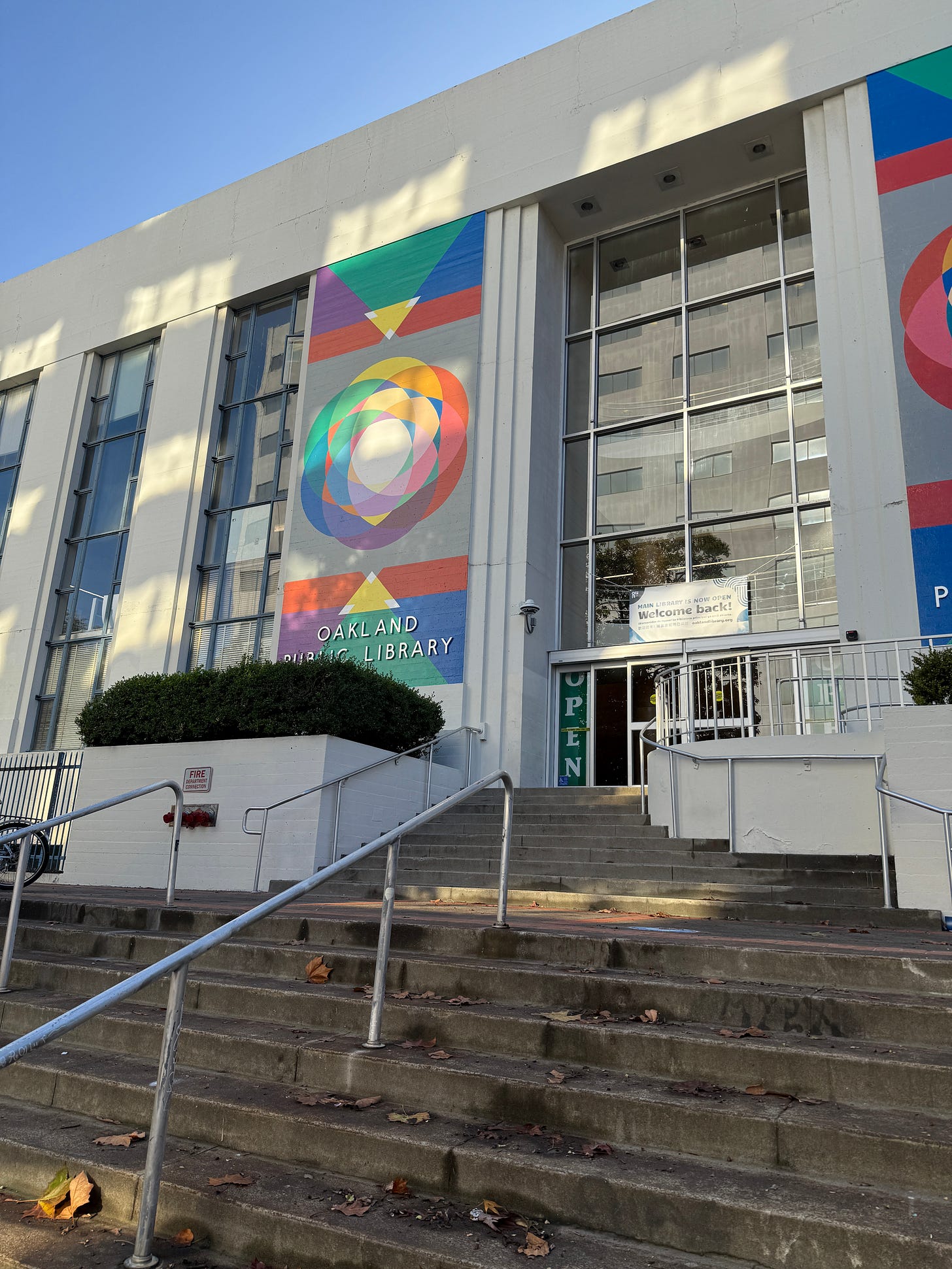
Inside, libraries are filled with mild drama, like, who’s shown up for work smelling of gin? Or why have those two been away for too long? What’s everyone eating? Who stole Bernard’s Pepsi?
Operationally, the coffee is always radioactive-strong. The microwave keeps shorting the building out.
As a librarian, you have the sisyphean task of clearing all paper jams from all the printers—but just on your floor.
The San Francisco Main Library is one of the busiest and prettiest in the world. It’s also one of the smelliest—both good and bad. It was the first library in the country to adopt Library Social Workers. I was in awe with the sheer efficiency of how our books and other materials circulated.
My library friends still work there. They do their magic. One handles all the materials that are about California. I have a friend that runs all the events.
But for me, who am I without a library. Am I still a librarian?
A friend once said, “You’re still a librarian. Just not there anymore.”
Who says you need to be in a physical space to be one especially when you have the advanced degree to prove it?
It’s a chapter in my life I can write about. I know what it’s like to stand behind a reference desk and be asked, “Where are the restrooms?”
I’m happy I got to pursue something I’ve always wanted. My ex said I’d make a great librarian. My career strategist pushed me. She called me an information whore—basically.
I applied to library school and got in.
Then, I was diagnosed with breast cancer—and went through grad school going to radiation, then chemo. It’s why my hair is so short in some of my earlier days as a librarian and archivist (2).
I started my career volunteering and later working at archives. I also managed digital collections in the corporate world. I did volunteer work at The Sutro Library where I got to do map archiving and cataloging. My experience doing both set me apart from my peers.
Before that, being in this world was simply a dream that felt unobtainable.
It was. Breast cancer almost stopped me, but I had to see things through. Below is a picture the year I graduated from library school—
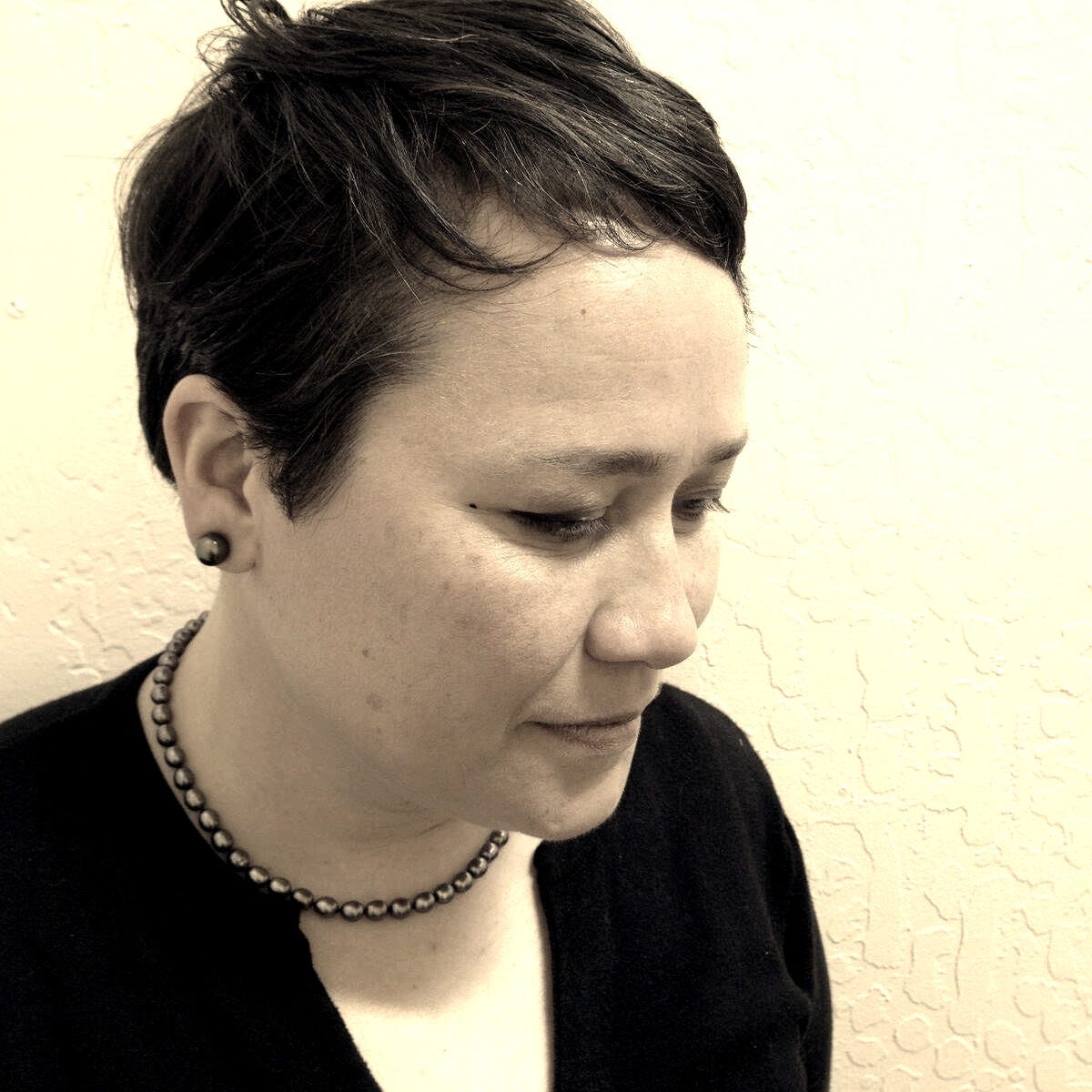
Enter: The Librarian—
I’d say, every librarian has an “origin story.” Mine? My story started the minute I was hungry to feed my mind.
In the first half of my childhood—up until about 8–I was starved for information, stimulation, books, and things to touch. We were poor in the sense that I had a lot of siblings I shared resources with. My dad had a mortgage to pay. Mouths to feed. Children and teens to clothe. We didn’t have much to go around.
Some of my grade school friends had full on libraries in their rooms. Their books were all over the place. If I only had the luxury of reading like them!
I wonder what kind of woman I would be now had my parents entreated my basic desires—to read? What if they bought books for only me? Who knows. I only have me now, and the me now reads everything she wants.
Yet, it’s also a small miracle I can read.
My mother only went as far as the 5th grade. My white American father started reading at 13. He was passed on year after year, and it was a nun who figured out he couldn’t read, then she taught him.
Libraries teach you how to read.
As my dad wasn’t a reader, he wasn’t comfortable reading books to me. Or my siblings. He did teach me how to read penny stocks & horse racing tables in the newspaper though.
My mom taught me how to read by making drawings and writing the phonemes of them—the smallest part to a word.
We didn’t have books. We weren’t read to enough. I felt as if I was the only one jazzed about reading in my family save for my sister.
The only thing we had growing up was a few Cat in the Hat books, some Nancy Drew, a smattering of Ian Fleming, and the good old World Book Encyclopedia from Chicago, Illinois.
From the time I was able to read—about 6—until age 11, I had read the entire encyclopedia set.
If I wanted something extracurricular to read, I had to earn it by doing chores, then buying them at school from the Scholastic catalog. Remember those?
Things got a little better once my mom bought the store. It was a beer, wine & grocery store in East LA. She was Nellie. So, she named it Nellie’s Market. That place was a resource for me. We had dime store comics. We had MAD & Heavy Metal. We had porn, newspapers, lifestyle magazines, novellas, and sensacionales (or ghetto librettos—adult Mexican comics).
My mind became flooded with these. Maybe it’s why I didn’t bat an eyelash at all the adult material at the sex education library/archive I worked at much later in my life — The Center for Sex & Culture. Maybe it’s why I could stare down images of mutilated and people suffering from burns in the war and peace archives at the Hoover?
I’d find ways to earn money at my mom’s store to buy books from Scholastic in order to buy my own adventures.
There’s always the library—
What was better than having my own books? The library!
There were free books there. Not mine forever. I didn’t need them forever. I needed to read them & devour them.
At 11 I had this interest in comics—just attempting to get everything on paper. By 13, I was writing, pencilling, and inking my own comics. It wasn’t until I dove back into Volume 4: Ci-Cz where I found out how cartoonists pencilled panels, drew the scenes, wrote cartoon bubbles over the characters, then inked them.
I saw the process. I copied it.
I wanted to do better, so I skateboarded up to the Memorial Branch Library in LA and asked the reference librarian, “Do you have a book on how to make comics?”
She pointed me to comics.
“No, I want to MAKE them.” Maybe I said that with arms akimbo Ramona style.
“Oh. We have one.” She wrote down the call number.
It was Jack Ham’s “Cartooning the Head and Figure.” I checked it out, and came back a week later, “I’m done with it. I copied everything in there.”
I showed her my comic called “Pookie” which was like SNL’s “Mr. Bill.”
She smirked, and said, “Ohh nooo,” she joked. “You need another book? Other books on how to draw comics, right? I can order you some.”
I felt special she was ordering books for me, but really, everyone. I felt like it was the best win-win experience in all my life!
From that moment on, I saw a job that I could maybe do one day. She was a Japanese American librarian. She knew everything on reference. I don’t recall her name. I do recall her face.
I also wanted to be other things.
However, this librarian really changed the course of my life by simply ordering more “how to draw comics” books.
Comics—like my poetry in later life—saved me from becoming an incredibly depressed teenager.
I had reasons to get depressed. I was abused as a child, to put it mildly. Later, before my senior year, something very horrible happened to me. It’s too heavy for an article on National Library Week, trust me.
Writing and drawing my own comics gave me a chance to create a world where parts of me were cared for.
I started with “Pookie” who was an invisible teddy bear who would get into all sorts of trouble at the hands of his owner Mr. Stripe—who was never depicted. He was just a set of hands (or a hand) wearing a pin stripe suit who’d get Pookie into all sorts of peril. The poor teddy bear met his demise at the end of each panel only to resurrect the next strip.
In high school, to make sense of feeling alien to others, I did a comic called “A Cow Named Luca,” who was deformed because she was from a farm near Chernobyl. The farmers didn’t like her so they filled her up with air and she floated to Montana. An American farmer, Roy, adopts her!
I was 15 when I created that one.
My friends in high school liked reading them in the school paper. As it stood, I felt strange and awkward to begin with. Here I am, some bi-racial girl who knows deep down she’s queer. It’s the 80s. She’s in an inner city all girls’ Catholic school.
Feel the layers of socioeconomic oppression, please.
There’s all this unseen pressure to conform, and yet, there was no way I could conform. I didn’t share my school mate’s demographic.
I felt like Molly Ringwald’s character in “Pretty in Pink” but of another land and another race.
My teacher, Mr. Aberle, would push me to make another so our paper wouldn’t be so text heavy and full of blurry photography.
I wouldn’t have cultivated my talent for drawing comics if it weren’t for that library.
Comics + Libraries—a life long love affair
I still draw comics. It took ages for me to get back into drawing & writing something. I’m glad I have THEM CATS—which can be found here on Visual Liquid.
For a good chunk of my life, I couldn’t put my characters in panels. Too boxed in. I struggled for years to draw comics sequentially during my breast cancer days in my late 30s.
Those days of drawing full stories that had some logic to them are gone. What I choose to draw now is fluid, unrestrained, and very anachronistic.
In my undergrad—I studied Behavioral Science at Metropolitan State University of Denver—I managed to do weekly editorial illustrations for our school paper. It was rewarding to do an editorial illustration for the Insight section of The Metropolitan.
Below is a modern editorial comic I never published on stimulus checks during the pandemic. I turned to doing these for myself to make sense of what was going on—
Doing editorial art is different from drawing sequential art. Before that, I did do stop-motion animation too.
I owe the comics, animation, and editorial art to that encyclopedia, and the various materials I’d check out at the public library.
In the arc of my life—if I trace things back—I can say a lot hinged on that moment I asked to read another book.
Books set you free, man.
National Library Week—it’s to celebrate libraries, and to raise awareness to the work librarians and library workers do to enrich our communities
April 6 to 12, 2025: https://www.ala.org/events/national-library-week-2025
You were an archivist too, Tess? Yes. I talk about my days at The Hoover Institution here: https://visualliquid.substack.com/p/most-of-the-archival-collections?r=123f9j
INALJ (I Need A Library Job), “When Archives and Comics Collide,” an article on me landing my first archives gig:
https://inalj.com/?p=37487
EPortfolios for library students and, how to do a career transition: https://ischool.sjsu.edu/student-group/e-portfolios-career-transitioning-tess-mccarthy
Gallery: Remember these?
- Scholastic, circa 1985
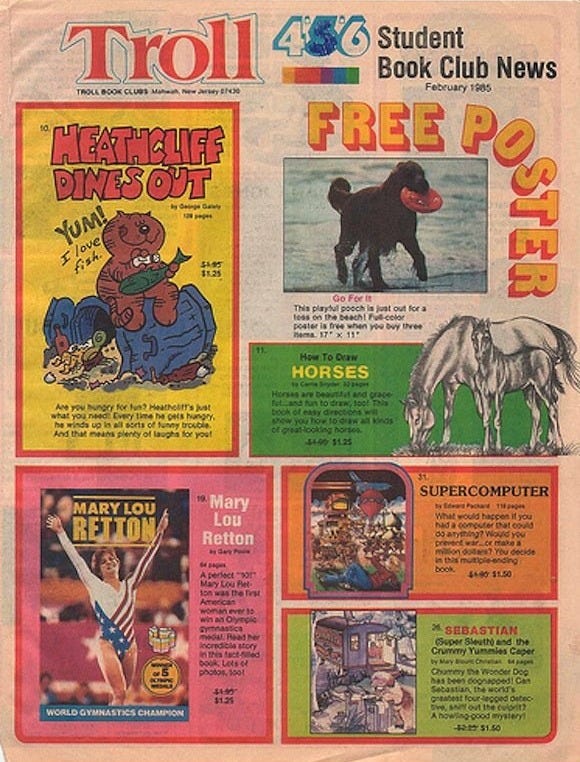
- World Book Encyclopedia, circa 1971
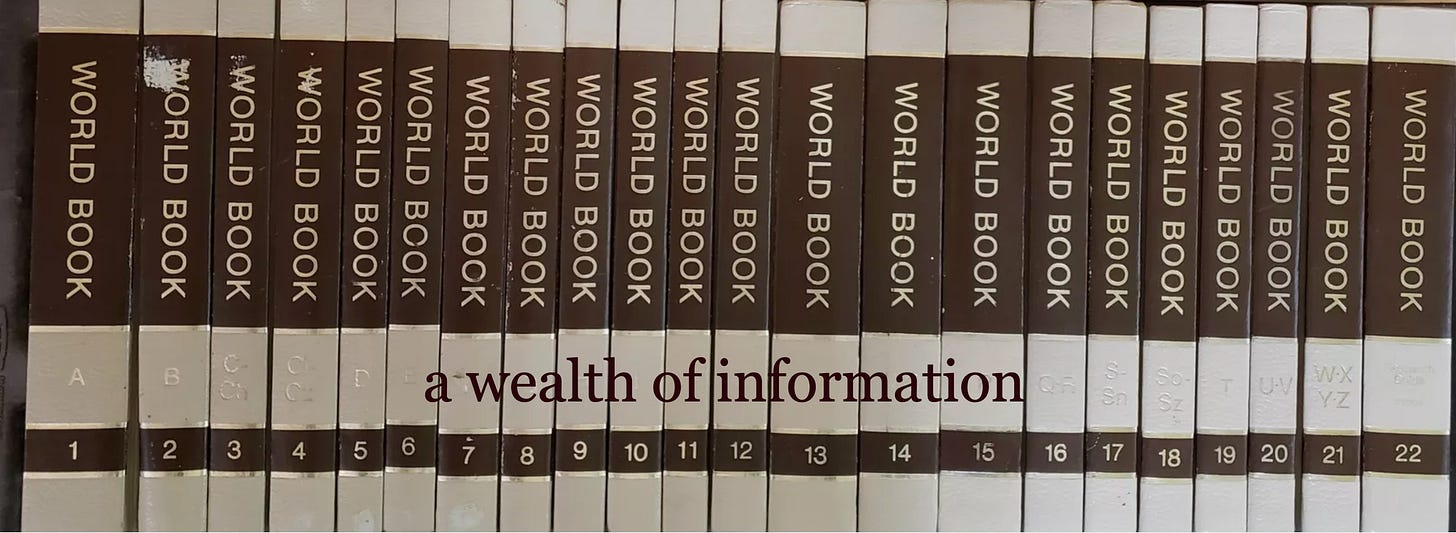
- Sensacionales
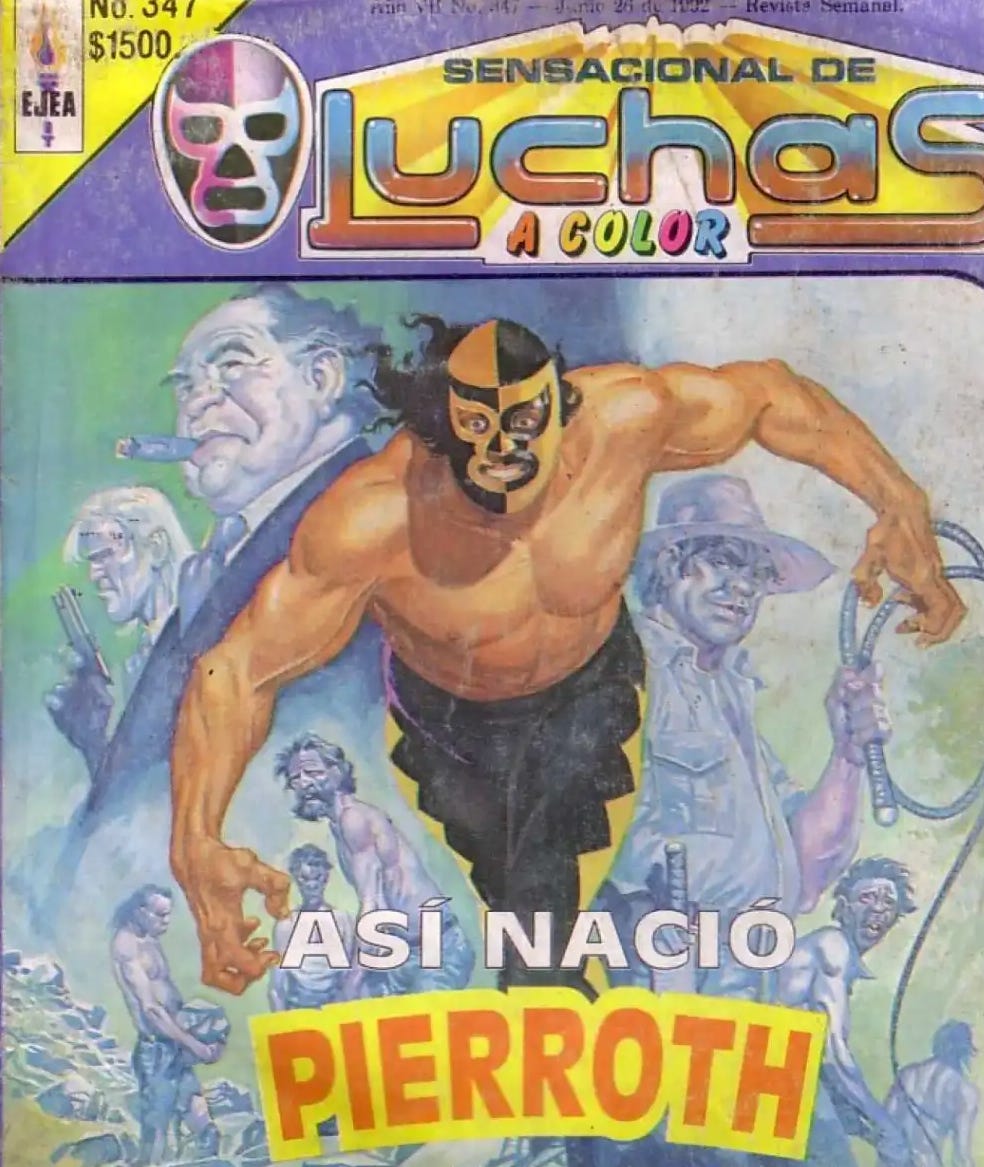
- MAD Magazine
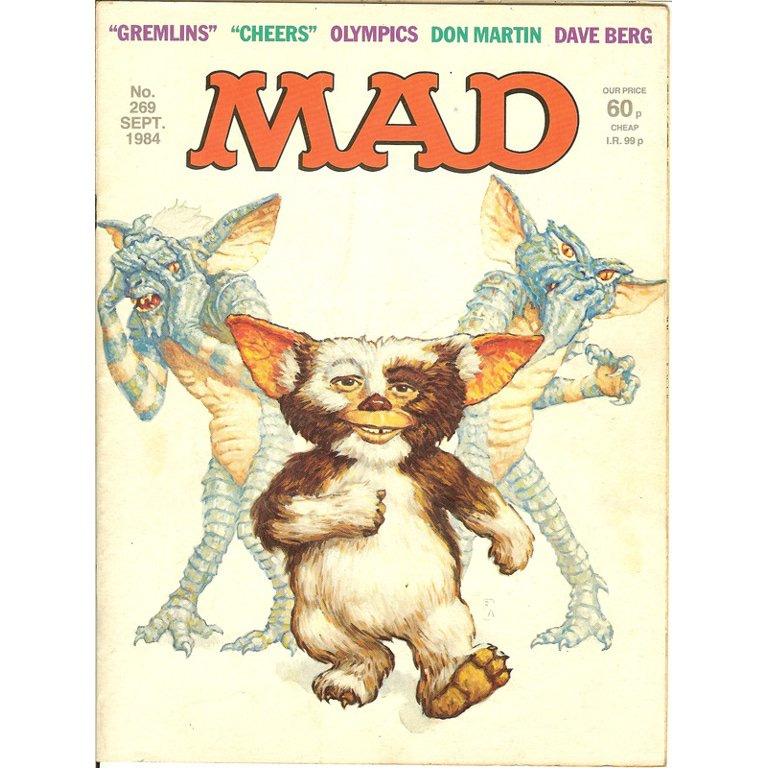
- Heavy Metal
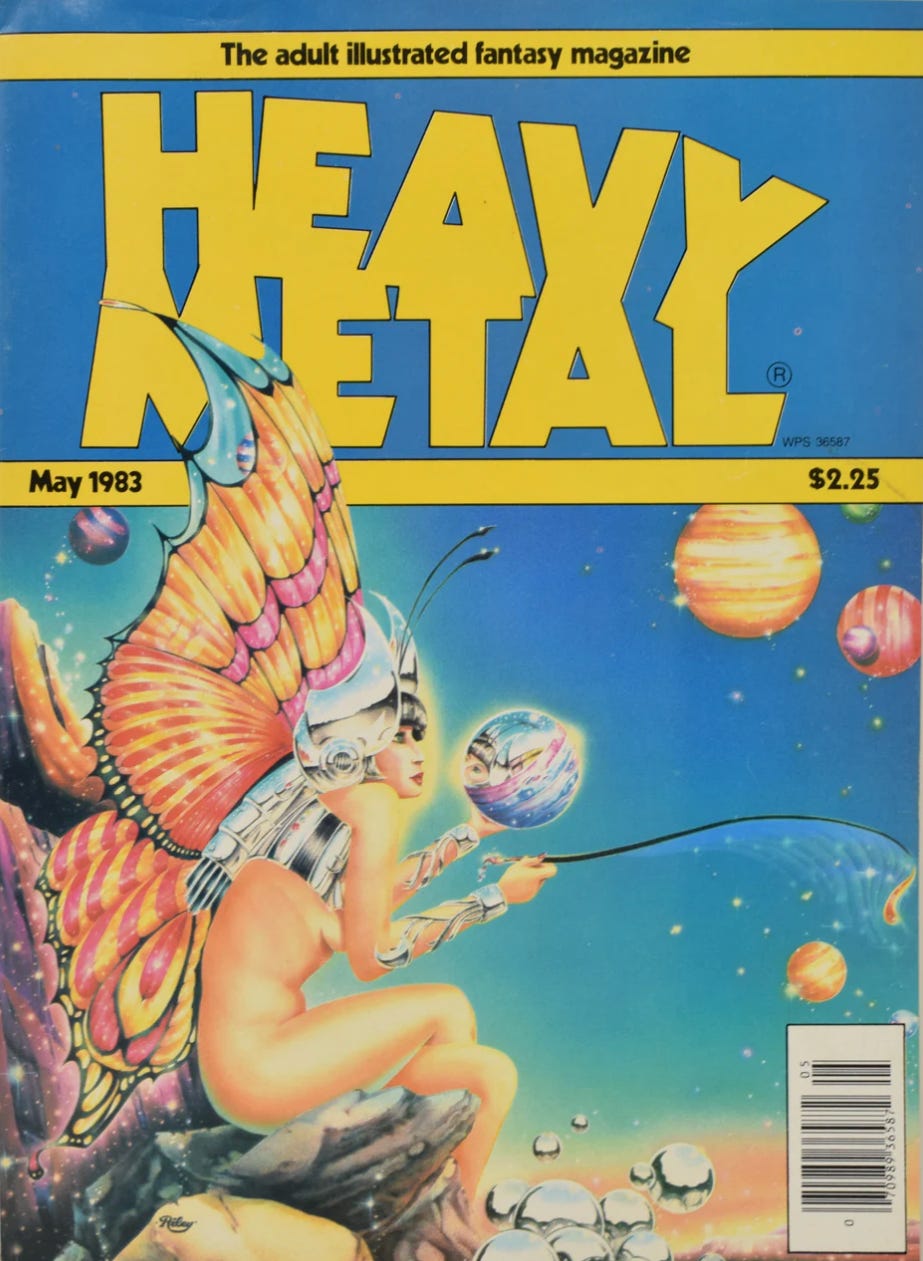







What a beautiful story. Damn. I am very moved by how much you love books.
Tess, what a journey you have had and are on. My heart hurt a little for you. What grit and determination you have had since being a little girl. Like you, I have always been obsessed with books. As a child my thing was pony books and I would sit on the floor in bookshops for ages reading them! I think my parents still have a lot of the books I had as a child. I wrote, too. A play when I was about 8, and so many stories and letters to my nana in England (we lived ,and I still live , in Switzerland. I can’t wait to read more of your stories. Hugs, Francesca